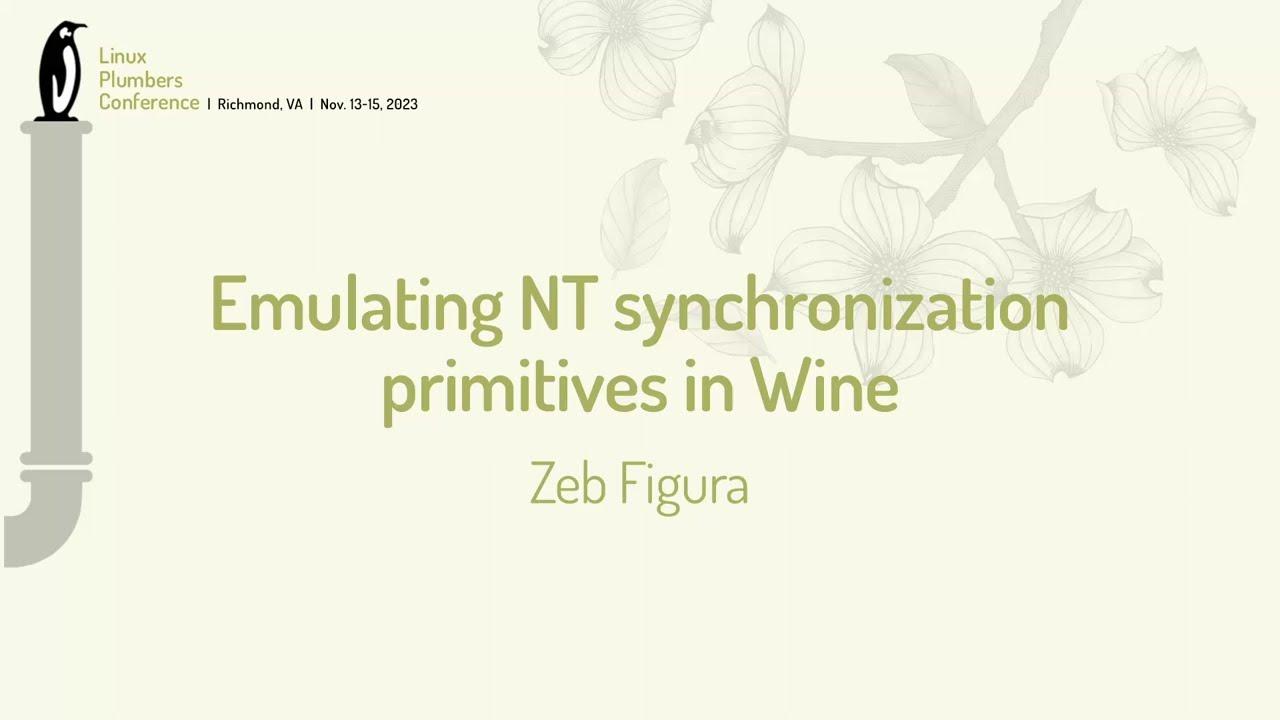After waiting quite a while on it and some rewrites, it looks like the NTSYNC driver code to help Windows games running on Linux will be pulled in and enabled in the Linux kernel.
Developer Elizabeth Figura posted version 7 of the kernel patch back in December 2024. As a reminder, here's how they explained it:
The Wine project emulates the Windows API in user space. One particular part of that API, namely the NT synchronization primitives, have historically been implemented via RPC to a dedicated "kernel" process. However, more recent applications use these APIs more strenuously, and the overhead of RPC has become a bottleneck.
The NT synchronization APIs are too complex to implement on top of existing primitives without sacrificing correctness. Certain operations, such as NtPulseEvent() or the "wait-for-all" mode of NtWaitForMultipleObjects(), require direct control over the underlying wait queue, and implementing a wait queue sufficiently robust for Wine in user space is not possible. This proposed driver, therefore, implements the problematic interfaces directly in the Linux kernel.
This driver was presented at Linux Plumbers Conference 2023. For those further interested in the history of synchronization in Wine and past attempts to solve this problem in user space, a recording of the presentation can be viewed here:
YouTube videos require cookies, you must accept their cookies to view. View cookie preferences.
Direct Link
The performance uplift when using this versus the current upstream Wine could be pretty significant in some games. As Figura noted from the earlier patches, which are from different people on different hardware:
| Game | Upstream | ntsync | improvement |
| Anger Foot | 69 | 99 | 43% |
| Call of Juarez | 99.8 | 224.1 | 125% |
| Dirt 3 | 110.6 | 860.7 | 678% |
| Forza Horizon 5 | 108 | 160 | 48% |
| Lara Croft: Temple of Osiris | 141 | 326 | 131% |
| Metro 2033 | 164.4 | 199.2 | 21% |
| Resident Evil 2 | 26 | 77 | 196% |
| The Crew | 26 | 51 | 96% |
| Tiny Tina's Wonderlands | 130 | 360 | 177% |
| Total War Saga: Troy | 109 | 146 | 34% |
Something to note is that this is aimed at replacing earlier solutions of esync and fsync, which did already improve performance, but this being in the kernel will give the improvements for everyone including eventually plain Wine as well as Valve's Proton.
Phoronix noted that they expect it will arrive in Linux kernel version 6.14 due out sometime in March. Going by other developer comments, it certainly seem like it will finally land.
wait... 860.7 fps? is there even an monitor with that refresh rate to confirm its was runing at that speed? probably is a old game but i doubt the performance would be comparable on windowsDoubt it but it serves as a benchmark :)
The primary problem with kernel involvement remains: crashes.
Wine can't help, but be a really crashy program.
In the kernel a crash means a reboot, while in user space it means a signal: making it recoverable.
The primary problem with kernel involvement remains: crashes.I mean, sure... but when was the last time you had a game crash? I play a LOT of games, and an actual game crash, or worse, freeze? It's like once a year if that.
I see little hope for it.Note that NTSync doesn't mean that any part of the game or WINE runs in the kernel so there are basically no added risk of kernel crashes here.
The primary problem with kernel involvement remains: crashes.
Wine can't help, but be a really crashy program.
In the kernel a crash means a reboot, while in user space it means a signal: making it recoverable.
Last edited by Shmerl on 14 Jan 2025 at 2:02 am UTC
Most of all I hope this fixes the Forza Horizon 4 & 5 stuttering@based On what hardware? I play both games on my GPD Win Mini 2024 running Bazzite, and have zero stutters - I get a constant 60FPS on low (with FSR set to performance).
Iirc it happened on my Deck as well
Something trying to imitate external(Windows) behavior still runs in the kernel.
Something will try to access an edge case and render the entire thing catatonic.
Something trying to imitate external(Windows) behavior still runs in the kernel.That applies to everything in the kernel and therefore every piece of software. There's a reason why these patches take so long to be accepted in the mainline kernel.
Something will try to access an edge case and render the entire thing catatonic.
I mean, sure... but when was the last time you had a game crash? I play a LOT of games, and an actual game crash, or worse, freeze? It's like once a year if that.Hunt: Showdown regularly crashes, and sometimes takes the whole system with it
<quote>Something trying to imitate external(Windows) behavior still runs in the kernel.
Something will try to access an edge case and render the entire thing catatonic. </quote>
Look at the actual code, it is extremely simple.
Aka we are talking about a few codeblocks that looks like this:
static int ntsync_mutex_kill(struct ntsync_obj *mutex, void __user *argp)
{
struct ntsync_device *dev = mutex->dev;
__u32 owner;
int ret;
if (get_user(owner, (__u32 __user *)argp))
return -EFAULT;
if (!owner)
return -EINVAL;
if (mutex->type != NTSYNC_TYPE_MUTEX)
return -EINVAL;
if (atomic_read(&mutex->all_hint) > 0) {
spin_lock(&dev->wait_all_lock);
spin_lock_nest_lock(&mutex->lock, &dev->wait_all_lock);
ret = kill_mutex_state(mutex, owner);
if (!ret) {
try_wake_all_obj(dev, mutex);
try_wake_any_mutex(mutex);
}
spin_unlock(&mutex->lock);
spin_unlock(&dev->wait_all_lock);
} else {
spin_lock(&mutex->lock);
ret = kill_mutex_state(mutex, owner);
if (!ret)
try_wake_any_mutex(mutex);
spin_unlock(&mutex->lock);
}
return ret;
}











 How to setup OpenMW for modern Morrowind on Linux / SteamOS and Steam Deck
How to setup OpenMW for modern Morrowind on Linux / SteamOS and Steam Deck How to install Hollow Knight: Silksong mods on Linux, SteamOS and Steam Deck
How to install Hollow Knight: Silksong mods on Linux, SteamOS and Steam Deck